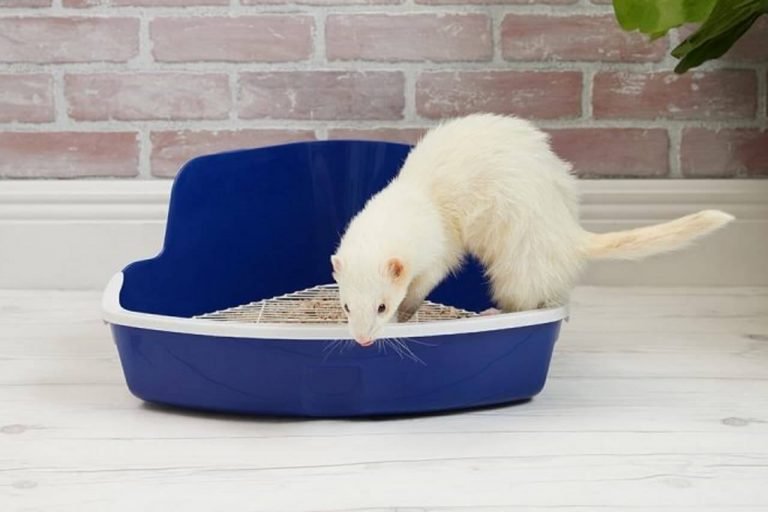What do Ferrets Eat?
Ferrets are playful, energetic pets. They need the right food to stay healthy and active. A poor diet can make them sick. Their digestive systems are sensitive, so feeding them correctly is really important.
If you get what a ferret needs to eat, you can easily plan their meals. It keeps them happy and full of life.
What Do Ferrets Eat In The Wild?
Ferrets are not wild animals. They came from the European polecat, a long time ago. People domesticated them to hunt rabbits and keep rodents away from farms. This means human homes are their natural habitat.
If you let a pet ferret go into the wild, it would only live for a few days. They just don’t have the skills to hunt or build shelter.
Ferrets are strict carnivores. They eat small creatures like prairie dogs, rabbits, and mice. They also hunt rats, voles, snakes, birds, and frogs. When food is scarce, they might eat other animals. Studies of ferret droppings have even shown traces of squirrels, gophers, and fish.
A ferret’s meal includes raw meat, bones, and connective tissue. They also get nutrients from the digested plant matter in their prey’s stomach. Like other animals in the weasel family, ferrets get all their daily calories from meat.
What Does A Ferret Diet Consist Of?
Ferrets have a fast metabolism. They need to eat many times each day to keep their energy up. They sleep a lot, but they take many short naps. Your furry friend will play for about an hour, eat, then nap. They eat roughly every four or five hours. This means they need five to eight meals daily.
Since ferrets are carnivores, their diet must be mostly animal protein.
The American Ferret Association says a ferret’s diet should have:
- High protein: 30 to 40%
- Moderate fat: 15 to 20%
- Low carbs and fiber: Less than 5%
Today, you can find ferret food in most pet stores. This food usually has the right nutrients. Always check the ingredient label. Make sure the first ingredient is an animal-based protein, such as chicken, lamb, or turkey.
You can also make home-cooked meals for your ferret if you prefer fresh, organic options.
Protein
Chicken, lamb, and turkey are some of the best meat choices for your ferret. They offer good protein, plus vitamins and minerals. These include B-complex vitamins, magnesium, and potassium.
You can cook these meats, but raw food is often better. A ferret’s digestive system can absorb raw food more easily. Beef and pork are also options. But some ferrets might get bloated or uncomfortable from them.
Be careful with raw pork. It can carry a parasite called Trichinella. This parasite can cause digestive issues, malnourishment, and anemia. If you feed pork, it must come from a clean, trusted supplier.
Raw liver pieces are another excellent choice. They are rich in iron and protein. You can also use liver as a snack or training reward.
Ferrets are not vegetarians. Never use vegetable protein as their main protein source. Humans and some other animals can break down vegetable protein. They have a cecum, part of the large intestine, that digests unprocessed food. Ferrets do not have a cecum. They cannot get the necessary nutrients from plant protein.
Eating vegetable protein can lead to poor nutrient absorption. This can cause malnourishment, weight loss, and even death. So, vegetable protein is not good for a ferret’s diet.
Carbohydrates And Fiber
Fruits, vegetables, and starches can cause health problems if ferrets eat too much. Remember, ferrets have a fast metabolism. Food moves through their short digestive system in about three to four hours.
You must feed your ferret food that digests easily. This helps them absorb nutrients better. Complex carbohydrates, fruits, and starches have a lot of fiber. Fiber takes longer to digest. This can slow down your ferret’s digestive system.
Whole grains like rice and corn, and also bread, are risky. They can get stuck in your ferret’s intestines. This causes a blockage. A blockage is life-threatening and needs surgery. It causes belly pain, bloating, and vomiting. Your ferret won’t be able to poop.
If not treated fast enough, it can be fatal. So, keep carbs to a minimum. It’s safest to just cut them out of your ferret’s meals completely.
Overall, a ferret’s diet should focus on animal protein. Keep carbs very low. Chicken and lamb offer the best protein quality. Beef, pork, and liver are good alternatives.
What Do Baby Ferrets Eat?
Ferrets usually mature sexually around six to eight months old. Then they can reproduce. If your female ferret, called a jill, gets pregnant, you must change her diet.
She needs high-quality ferret food. Her protein intake must be higher to stay healthy during pregnancy. Protein should increase to 45 to 50%. You should add raw chicken and liver. Also, she needs constant access to water to prevent dehydration.
A ferret’s pregnancy lasts about 42 days. She can have five to seven baby ferrets, called kits. Kits are born blind, deaf, and very fragile.
They must stay with their mother for the first six weeks. Kits only drink milk until they are three weeks old. The jill’s diet needs enough protein to support proper nursing.
When kits are three weeks old, you can start giving them baby ferret food. But they still need to nurse. Kits also need high-quality ferret food and enough protein for good growth and strong health. Their teeth are still growing, so soak their food. This makes it soft and easy to chew.
Raw meat is also a good choice if you can’t find baby ferret food. Stick to lamb, chicken, and liver for young kits. Once kits are six to seven weeks old, you can start to wean them from their mother. Introduce normal ferret food or home-cooked meals. Remember, fats are also important, and still avoid carbs and fiber.
What Do Ferrets Drink?
Ferrets must have water available to them all day. Their quick metabolism means they dehydrate easily. They drink water often to stay hydrated, about 20 to 25 times a day. Good hydration helps them have pain-free bowel movements.
You can give your ferret water in bottles or bowls. Water bottles are often better for cages. They are more hygienic and convenient. Bowls work well when your ferret is playing in your home. Place a bowl in any room where they can explore. You should change the water twice daily to keep it fresh and clean.
Your ferret doesn’t need other liquids to stay healthy. Some soups, like duck soup, are fine because they contain meat. But you should never give your ferret sodas, sugary drinks, or juices. These have sugar and no nutritional value.
Certain Food Products To Take Into Consideration
Eggs
Eggs make a great afternoon snack for your ferret. They provide good protein and other nutrients. These include vitamin A, vitamin D, iron, and potassium. Eggs can also make your ferret’s fur and skin shinier and healthier.
Boiled eggs are a nice treat. Raw eggs are also a good option. But eggs should never replace a meat-based meal. They don’t have the same nutritional value as chicken or lamb. Also, give them in moderation. Too many can cause weight gain.
Cat Food
If your local pet store doesn’t have good ferret food, you might use certain cat foods. Make sure they are “ferret-friendly.”
First, chicken or lamb must be the main ingredient. Protein should always be the primary energy source. Dry cat food is usually best. It helps with teeth health and is easier to digest. Avoid wet canned food and vegetable-based cat food. They have less nutritional value. They can also cause problems like diarrhea and vomiting. Skip fruit and vegetable treats too.
If you feed your ferret cat food, you must add a fatty acid supplement. Omega-3 fatty acids, for example. This helps with nutrient absorption. You can find these as pastes or pellets in most pet shops.
Fish
Black-footed ferrets might eat fish in the wild. But it’s not a natural part of their typical diet. Tuna and salmon have protein and fat. These can be good for your ferret. However, most ferret owners advise against feeding them fish. It makes their musky scent stronger.
When ferrets eat fish, their poop and pee smell more. They contain more ammonia. Their natural smell also gets more powerful. So, it’s best to avoid giving your ferret fish. Choose other meat options like lamb or turkey instead.
Dairy
All dairy products, like milk, yogurt, and cheese, are off-limits for ferrets. Ferrets drink milk when they are nursing from their mothers. After that, they become lactose intolerant. Any dairy can lead to digestive issues and dehydration.
Lactose-free milk is also not a good choice. It replaces lactose with sugar, which is harmful too. So, it’s best to avoid all dairy products.
Mealworms
Mealworms don’t seem to cause any bad effects in ferrets. But they don’t provide enough nutrients to be a regular part of their diet. You can use them as rewards or treats. Just remember, they are not a substitute for a real meal.







